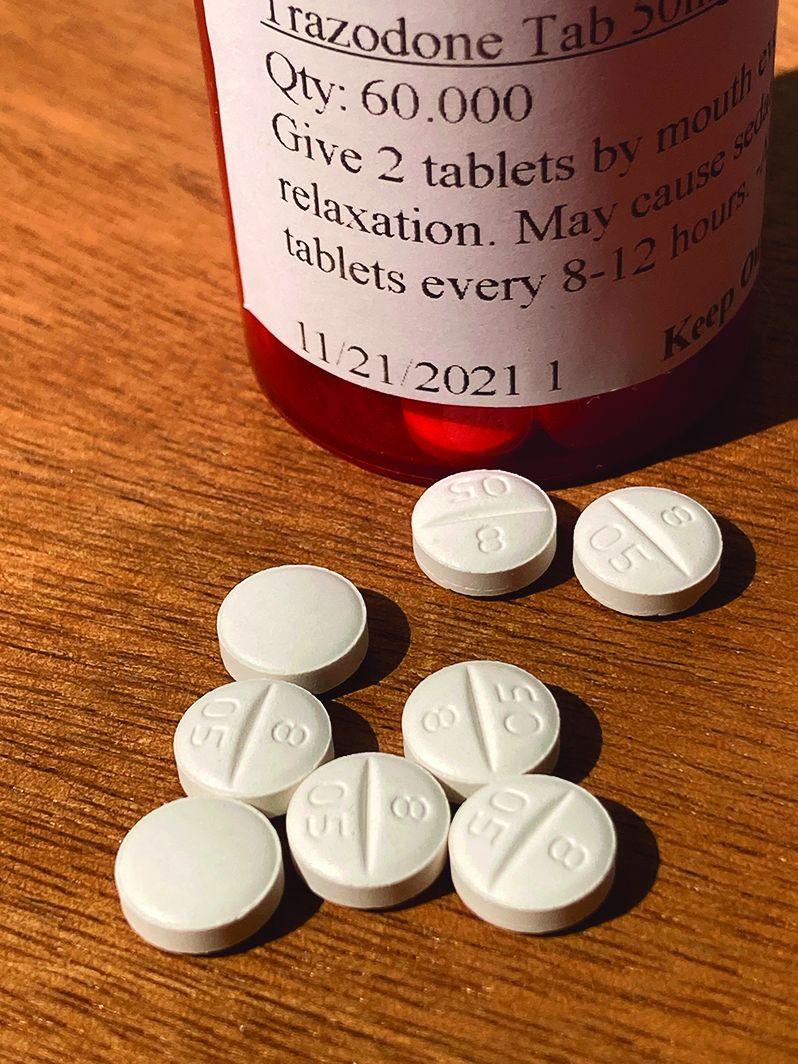Trazodone is a commonly prescribed medication for dogs to help manage anxiety and stress, particularly in situations like veterinary visits or before surgery. As a pet owner, understanding when and how to administer trazodone can significantly improve your dog's comfort and overall surgical experience. This comprehensive guide will explore the use of trazodone for dogs before surgery, its benefits, proper timing, and important considerations.
Understanding Trazodone for Dogs
Trazodone is a serotonin antagonist and reuptake inhibitor (SARI) that helps increase serotonin levels in the brain, promoting relaxation and calmness in dogs. It's often used to manage various anxiety-related conditions and situations, including:
- Pre-surgical anxiety
- Veterinary visits
- Travel-related stress
- Separation anxiety
- Noise phobias (e.g., fireworks, thunderstorms)
Benefits of Using Trazodone Before Surgery
Administering trazodone before surgery can offer several benefits for both the dog and the veterinary team:
- Reduced anxiety and stress
- Improved cooperation during pre-surgical procedures
- Decreased risk of complications due to stress-induced physiological changes
- Smoother induction of anesthesia
- Potentially lower anesthetic doses required
When to Give Trazodone for Dogs Before Surgery
The timing of trazodone administration is crucial for its effectiveness during surgical procedures. Generally, veterinarians recommend giving trazodone to dogs 2-3 hours before traveling to the veterinary hospital. This timing allows the medication to take effect, helping the dog remain calm during the journey and while waiting for the procedure.
Factors Influencing Trazodone Timing
Several factors can influence the optimal timing for trazodone administration:
- Individual dog's response: Some dogs may metabolize the medication faster or slower than others.
- Severity of anxiety: Dogs with severe anxiety may benefit from an earlier dose or a "boost" dose.
- Travel time to the veterinary clinic: Longer travel times may require adjusting the dosage timing.
- Fasting requirements: Trazodone can be given with a small amount of food, even if the dog is fasting for surgery.

Trazodone Dosage for Dogs Before Surgery
The appropriate dosage of trazodone for dogs can vary based on the individual dog's size, health status, and specific needs. Veterinarians typically prescribe trazodone within a dosage range of 1.7 to 9.5 mg/kg orally every 8 to 24 hours.
Trazodone Dosage Chart
Here's a general guideline for trazodone dosages based on a dog's weight:
| Dog Weight (lbs) | Dog Weight (kg) | Low Dosage (mg) | High Dosage (mg) |
|---|---|---|---|
| 10 | 4.5 | 7.65 | 42.75 |
| 20 | 9.1 | 15.47 | 86.45 |
| 30 | 13.6 | 23.12 | 129.2 |
| 40 | 18.1 | 30.77 | 171.95 |
| 50 | 22.7 | 38.59 | 215.65 |
| 60 | 27.2 | 46.24 | 258.4 |
| 70 | 31.8 | 54.06 | 301.1 |
| 80 | 36.3 | 61.71 | 344.85 |
| 90 | 40.8 | 69.36 | 387.6 |
| 100 | 45.4 | 77.18 | 431.3 |
Note: Always follow your veterinarian's specific dosage instructions, as they may adjust the dose based on your dog's individual needs and health status.
How to Administer Trazodone to Dogs Before Surgery
Proper administration of trazodone is essential for its effectiveness. Here are some guidelines to follow:
- Timing: Give trazodone 2-3 hours before traveling to the veterinary hospital.
- Food: Offer the medication with a small amount of food (about 1 tablespoon) to prevent stomach upset.
- Fasting: If your dog is required to fast before surgery, use only a tiny amount of food to give the medication.
- Pill pockets: Consider using pill pockets or other treat-like options to make administration easier.
- Follow instructions: Always adhere to your veterinarian's specific instructions regarding dosage and timing.
Tips for Successful Administration
- Use high-value treats to encourage your dog to take the medication.
- Remain calm and positive during the administration process.
- If your dog is particularly anxious, consider giving a "boost" dose the night before surgery as well.
Combining Trazodone with Other Pre-Surgical Medications
In some cases, veterinarians may recommend combining trazodone with other medications to enhance its calming effects. Common combinations include:
- Trazodone and Gabapentin: This combination can provide additional anxiety relief and pain management.
- Trazodone and Zylkene: Zylkene is a calming milk protein supplement that can complement trazodone's effects.
Always consult with your veterinarian before combining medications, as they will determine the most appropriate combination based on your dog's specific needs.
Can Humans Take Trazodone Before Surgery?
While this article focuses on trazodone for dogs before surgery, it's important to note that humans may also be prescribed trazodone for anxiety management. However, the use of trazodone before surgery in humans should only be done under the guidance of a medical professional. The dosage, timing, and appropriateness of trazodone use before surgery can vary significantly between humans and dogs.
If you're considering taking trazodone before surgery, consult your doctor or anesthesiologist for personalized advice and instructions.
When to Give Dog Trazodone Before Vet Visits
For routine veterinary visits that don't involve surgery, the timing of trazodone administration may be similar to pre-surgical recommendations. Generally, it's best to give trazodone to your dog 1-2 hours before the scheduled appointment time. This allows the medication to take effect before the potentially stressful experience of traveling to and visiting the veterinary clinic.
Factors to Consider for Vet Visits
- Travel time: Adjust the timing based on how long it takes to reach your veterinary clinic.
- Severity of anxiety: Dogs with severe anxiety may benefit from an earlier dose.
- Duration of effect: Trazodone's effects typically last 4-6 hours, so plan accordingly for longer appointments.
Potential Side Effects of Trazodone in Dogs
While trazodone is generally well-tolerated in dogs, it's important to be aware of potential side effects. Common side effects may include:
- Drowsiness or sedation
- Gastrointestinal upset (vomiting, diarrhea)
- Decreased appetite
- Ataxia (uncoordinated movements)
- Panting
In rare cases, some dogs may experience:
- Increased anxiety or agitation
- Priapism (prolonged erection)
- Serotonin syndrome (when combined with other serotonergic medications)
If you notice any concerning side effects, contact your veterinarian immediately.
Preparing Your Dog for Surgery: Beyond Trazodone
While trazodone can be an effective tool for managing pre-surgical anxiety, there are other steps you can take to prepare your dog for surgery:
- Follow fasting instructions: Adhere to your veterinarian's guidelines regarding food and water intake before surgery.
- Maintain routine medications: Continue giving prescribed medications unless otherwise instructed by your veterinarian.
- Create a calm environment: Keep your dog in a quiet, comfortable space before leaving for the veterinary hospital.
- Use pheromone products: Consider using calming pheromone sprays or diffusers in your home and car.
- Bring familiar items: Pack a favorite toy or blanket to provide comfort at the veterinary clinic.
Conclusion: Ensuring a Smooth Surgical Experience
Understanding when to give trazodone for dogs before surgery is crucial for minimizing stress and anxiety associated with veterinary procedures. By following your veterinarian's instructions regarding dosage and timing, you can help ensure a smoother, more comfortable experience for your canine companion.
Remember that every dog is unique, and what works best for one may not be ideal for another. Always consult with your veterinarian to develop the most appropriate pre-surgical plan for your dog, which may include trazodone administration along with other anxiety-reducing strategies.
By taking proactive steps to manage your dog's anxiety before surgery, you're contributing to a safer, more positive veterinary experience and potentially improving post-surgical outcomes.
